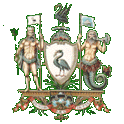

Last Updated : 30 Aug 2009
Pre-1900
Early Years
Emigration & Growth
Business & Prosperity
People
Public Houses
Sea Shanties
Contact
In the 1850’s around half of Britain’s imports were entering via Liverpool. Liverpool had been handling cotton since 1709 but cotton imports had for example gone up 200 times in under fifty years. In 1807 trade with America was disrupted when an embargo was placed on American ships sailing to foreign ports. During the American Civil War, the Federal blockade virtually brought Charleston, Savannah and other southern cotton ports to a halt and 75% of the cotton supply feeding Lancashires 2000 mills was cut-off.
Cotton was also a major driving force behind the construction of the Liverpool and Manchester Railway which opened in 1830 as the worlds first passenger main line railway.
Being dependent on one industry left Liverpool vulnerable to depressions from time to time. In the 1770s Liverpool suffered a grave decline in trade and a number of famous names became bankrupt. The outcome of the Boston Tea Party was catastrophic for Mersey shipping since it seriously reduced trade with Africa as well as with the Caribbean and America.
Liverpool ships actively participated in America’s War of Independence. One of the most savage battles was fought between the "Watt" of Liverpool and the American frigate "Trumbull". A New York newspaper reported:
The rebel ship was crowded with men and fought 19 guns a side. The Watt mounted 32 guns and had only 164 men on board, eleven of whom were killed and several wounded. The action was obstinate and bloody and the carnage on board the rebel frigate amazing as the vessels were for a considerable time yardarm to yardarm and the Watt, by the superior skill of her officers and the alertness of her crew, had the opportunity of twice raking her antagonist fore and aft which made her a slaughterhouse. She at last put before the wind and ran from the Watt which chased her for eight hours ……..
In those days the sea seemed the place to be and there were many youths looking for ways to get there – either to get out of the country or with romantic notions. Paddy West’s "nautical school" in Great Howard Street was seen as a solution for some. This not so reputable training establishment would produce "instant seaman" in return for his first two months pay.
As I was "rollin" down Great Howard Street
I strolled into Paddy West’s house
He gave me a plate of American hash
And swore it was Liverpool scouse
Said he, "Now young feller you’re here just in time
For aboard a big clipper you’ll very soon sign".
The American Civil War had a dire effect on transatlantic shipping. The poor downtown areas became more overcrowded and poorer during this war but at the same time great fortunes were made by some. Fast Mersey clippers did from time to time break the blockade of Charlestown and returned cargoes which sold at wildly inflated prices. When the war ended prices plunged catastrophically and losses of around £12,000,000 occurred in a few months. Two Liverpool banks failed and a number of wealthy citizens went bankrupt.
Liverpool was also actively involved in the American Civil War with many Merseyside built ships fighting on the side of the Confederacy. The impact of Merseyside built ships like the "Alabama" and the "Banshee" was so significant that after the war an arbitration tribunal in Geneva awarded the United States $15,500,000 as compensation.
The great losses as a result of the conflicts in America were to some extent countered by the start of new foreign trade in another direction. The "Kingsmill" owned by Sir John Gladstone was the first Mersey ship to sail to India after the East India Company’s monopoly of commerce with Indian ports was removed.
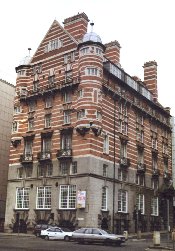 Many well known shipping lines are connected with Liverpool. The most important transatlantic steamship company after Cunard was White Star. In 1869, Liverpool’s Thomas H.Ismay founded White Star Line and entered the transatlantic trade in 1871. His headquarters, Albion House were built in 1898 and still stands today. At the time this was considered a huge building and amongst the biggest in England. In 1902, White Star was taken over by American financier J.P.Morgan. Five years later the company’s express liners were moved to Southampton on the south coast of England. Thomas’s son, J Bruce Ismay survived the Titanic disaster but with his career ruined. His American wife continued to complain through her Liverpool solicitors, about newspaper coverage of her husband up to 1962. There is a memorial to the Titanic, many of whose crew were from Liverpool at Saint Nicholas Place near the Pier Head. The Saddle Inn in Hackins Hey was run by Ismays cousin. See the separate page about Ships Connected with Liverpool.
Many well known shipping lines are connected with Liverpool. The most important transatlantic steamship company after Cunard was White Star. In 1869, Liverpool’s Thomas H.Ismay founded White Star Line and entered the transatlantic trade in 1871. His headquarters, Albion House were built in 1898 and still stands today. At the time this was considered a huge building and amongst the biggest in England. In 1902, White Star was taken over by American financier J.P.Morgan. Five years later the company’s express liners were moved to Southampton on the south coast of England. Thomas’s son, J Bruce Ismay survived the Titanic disaster but with his career ruined. His American wife continued to complain through her Liverpool solicitors, about newspaper coverage of her husband up to 1962. There is a memorial to the Titanic, many of whose crew were from Liverpool at Saint Nicholas Place near the Pier Head. The Saddle Inn in Hackins Hey was run by Ismays cousin. See the separate page about Ships Connected with Liverpool.
Two other shipping companies both founded in 1850 were the New York and Liverpool US Mail Steamship Company owned by Edward Knight Collins and the Liverpool and Philadelphia Steamship Company by William Inman which was the first to carry steerage passengers.
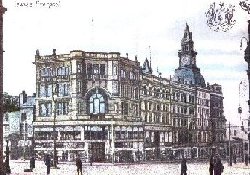 The Seamen’s Friend Society was founded in the 1820s to help Sailors keep away from dishonest landladies and crimps. They acquired a battleship "Tees" and moored it in one of Liverpool’s docks to provide quarters for mariners in port but only a small fraction of those ashore every night. In 1845 shipowners and merchants commissioned John Cunningham to design the Sailors’ Home at Canning Place which opened in 1847 and did not close until 1969.
The Seamen’s Friend Society was founded in the 1820s to help Sailors keep away from dishonest landladies and crimps. They acquired a battleship "Tees" and moored it in one of Liverpool’s docks to provide quarters for mariners in port but only a small fraction of those ashore every night. In 1845 shipowners and merchants commissioned John Cunningham to design the Sailors’ Home at Canning Place which opened in 1847 and did not close until 1969.
Liverpool has a well established university. It’s forerunner was Liverpool Institute which has a building with Greek façade in Mount Street off Hope Street which connects the Anglican and Roman Catholic Cathedrals. In 1844, Charles Dickens addressed a soirée in the assembly hall at the Institute.
There is also a long association with medicine in the city. The Liverpool Medical Institution opened in 1837. It’s large library contains books going back to the 1500s. The school of Tropical Medicine in Pembroke Place was established in 1898. The schools earliest professor of tropical medicine was Sir Ronald Ross. He was the first man to recognise the connection between the mosquito and malaria. Paludrine, the most powerful anti-malarial drug was developed there at the malarial unit.
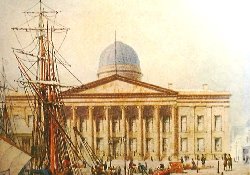 Many of Liverpool's pre-1900 buildings have now gone either, like with the Custom House shown here, as a consequence of World War 2 bombing or deliberate demolition. However, there are still many fine examples to see today. One of them is Speke Hall, a tudor mansion dating from 1490 and situated in secluded grounds seven miles south of the city centre. It was the ancestral home of the Norris family from the early 14th century though the site is recorded in the Doomsday Book of 1086. The artist Whistler often stayed at the hall and produced a number of sketches of it which are on display at Liverpool's Walker Art Gallery.
Many of Liverpool's pre-1900 buildings have now gone either, like with the Custom House shown here, as a consequence of World War 2 bombing or deliberate demolition. However, there are still many fine examples to see today. One of them is Speke Hall, a tudor mansion dating from 1490 and situated in secluded grounds seven miles south of the city centre. It was the ancestral home of the Norris family from the early 14th century though the site is recorded in the Doomsday Book of 1086. The artist Whistler often stayed at the hall and produced a number of sketches of it which are on display at Liverpool's Walker Art Gallery.
Liverpool's Town Hall, dating from 1754 is considered one of it's finest buildings. On the 6th November 1865, the last act of the American Civil War took place there when Lt. Commander James Waddel surrendered "Shenandoah", a British built Confederate raider to the Mayor, 211 days after arms had been laid down by General Robert E Lee. Many distinguished guests have been entertained there. During Liverpool's 700th anniversay celebrations Mark Twain visited the city and was entertained at a special Lord Mayors banquet.
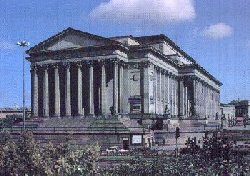 Another very impressive Liverpool building is Saint Georges Hall, with magnificant Greco-Roman style situated in Lime Street. Completed in 1854, in 1865 it was the location for a "Southern Bazaar" which raised £30,000 from local Confederate sympathisers, a large sum for those days.
Another very impressive Liverpool building is Saint Georges Hall, with magnificant Greco-Roman style situated in Lime Street. Completed in 1854, in 1865 it was the location for a "Southern Bazaar" which raised £30,000 from local Confederate sympathisers, a large sum for those days.
Rodney Street was laid out in 1783 and has some fine Georgian houses. It was named after Admiral Rodney who was famous for defeating the French at Les Saintes and keeping Jamaica a British colony. Other streets in the area are reminders of early trade links with America such as Baltimore Street and Maryland Street.
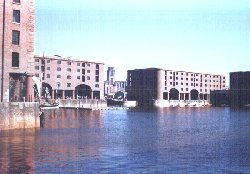 The Albert Dock complex is now restored as a tourist attraction. It was originally opened in 1845 and is the biggest Grade 1 historic building in Britain.
The Albert Dock complex is now restored as a tourist attraction. It was originally opened in 1845 and is the biggest Grade 1 historic building in Britain.
Saint Georges Church at Everton which still stands was built in 1814 and was the worlds first iron church.
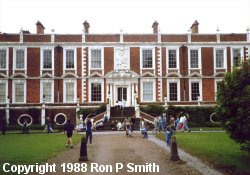 Croxteth Hall is on what was the estate of the Earl of Sefton which is over 1000 years old. The last Earl died in 1972. His American born wife left the estate to Liverpool City Council when she died in 1980.
Croxteth Hall is on what was the estate of the Earl of Sefton which is over 1000 years old. The last Earl died in 1972. His American born wife left the estate to Liverpool City Council when she died in 1980.
Nowadays English people outside Liverpool often refer to inhabitants of the city as "scousers" and their dialect as "scouse". This is due to a radio show called "ITMA" with a comedian called Tommy Handley. The origin is the word "lobscouse" – a sailors meal. "The Sailors Farewell" printed in 1768 uses the name "wacker" and this still is often used today by Liverpolitans or "Liverpudlians" and is often abbreviated to "Wack". Another nickname in popular use in the late nineteenth century was "Dicky Sam" which probably originates from Richard Samuals, a landlord of a pub frequented by sailors on Liverpool’s Mann Island.